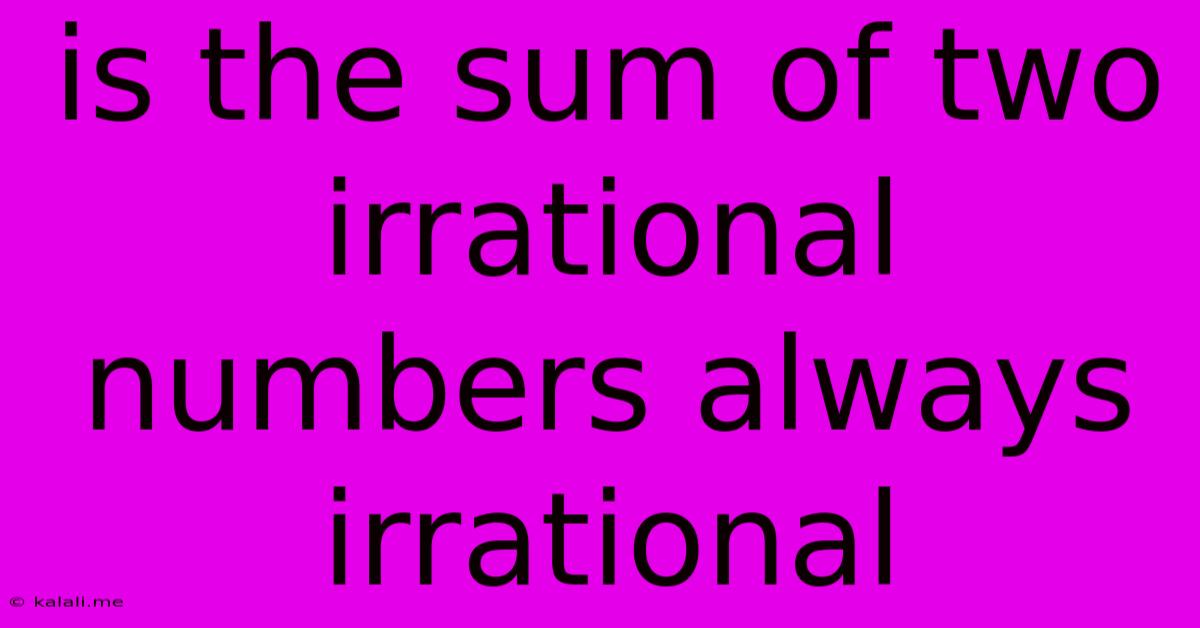Is The Sum Of Two Irrational Numbers Always Irrational
Kalali
Jun 14, 2025 · 2 min read

Table of Contents
Is the Sum of Two Irrational Numbers Always Irrational? A Deep Dive into Mathematical Logic
Meta Description: Explore the fascinating world of irrational numbers! This article delves into the question: is the sum of two irrational numbers always irrational? We'll explore the proof, counter-examples, and implications.
The question of whether the sum of two irrational numbers is always irrational is a common one in mathematics, and the answer, surprisingly, is no. While many might assume that adding two numbers without a finite or repeating decimal representation would always result in another irrational number, this isn't the case. Let's explore why.
Understanding Irrational Numbers
Before diving into the sum, let's briefly review what irrational numbers are. Irrational numbers are real numbers that cannot be expressed as a fraction p/q, where p and q are integers, and q is not zero. They have infinite, non-repeating decimal expansions. Famous examples include π (pi) and √2 (the square root of 2).
The Counter-Example: Proving the Sum Isn't Always Irrational
The simplest way to demonstrate that the sum of two irrational numbers isn't always irrational is to provide a counter-example. Consider these two irrational numbers:
- a = √2
- b = -√2
Both a and b are irrational. However, their sum is:
- a + b = √2 + (-√2) = 0
Zero is a rational number (it can be expressed as 0/1). Therefore, we've shown that the sum of two irrational numbers can, in fact, be rational.
Exploring Other Possibilities
While the above example uses additive inverses, let's consider a more general case. The key is that the irrational parts of the two numbers could potentially cancel each other out. Imagine two irrational numbers, x and y, where x and y are defined as:
- x = a + √b
- y = c - √b
Where a, c, and b are rational numbers, and √b is irrational. If we sum x and y:
- x + y = (a + √b) + (c - √b) = a + c
Since a and c are rational, their sum (a + c) is also rational. This demonstrates another scenario where the sum of two irrational numbers results in a rational number. This is a broader and more general proof compared to just using additive inverses.
Implications and Further Considerations
This seemingly simple mathematical property has significant implications in various areas of mathematics. It highlights the complexities of working with irrational numbers and reminds us that intuition can sometimes be misleading. Further exploration could involve investigating the probability of the sum of two randomly chosen irrational numbers being rational or irrational, a question that requires more advanced mathematical tools.
Conclusion
In conclusion, the sum of two irrational numbers is not always irrational. The counter-examples presented clearly demonstrate this. Understanding this seemingly simple yet counter-intuitive fact strengthens our understanding of the properties of irrational numbers and their behaviour under arithmetic operations. This seemingly simple concept opens up further investigation into the intricacies of number theory and mathematical analysis.
Latest Posts
Latest Posts
-
Which Of The Following Is Not An Application Layer Protocol
Jun 14, 2025
-
Which Of The Following Is A Renewable Energy Source Weegy
Jun 14, 2025
-
Select All Correct Statements On Whistleblowing
Jun 14, 2025
-
What Is The Percentage Of 300
Jun 14, 2025
-
Which Of The Following Is Radially Symmetrical
Jun 14, 2025
Related Post
Thank you for visiting our website which covers about Is The Sum Of Two Irrational Numbers Always Irrational . We hope the information provided has been useful to you. Feel free to contact us if you have any questions or need further assistance. See you next time and don't miss to bookmark.